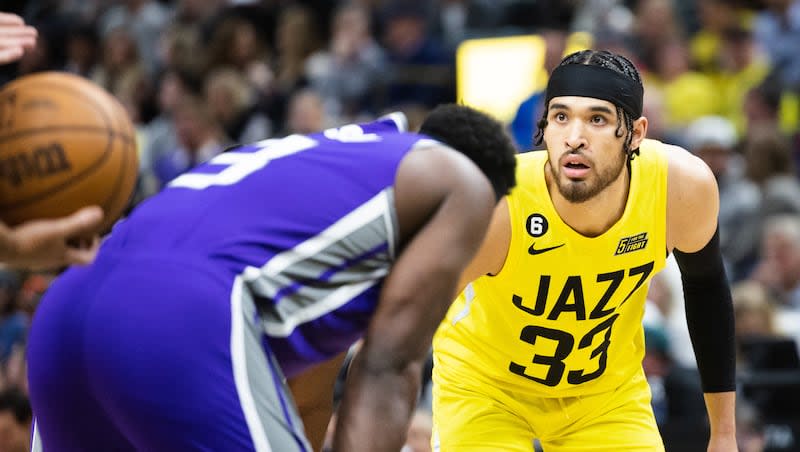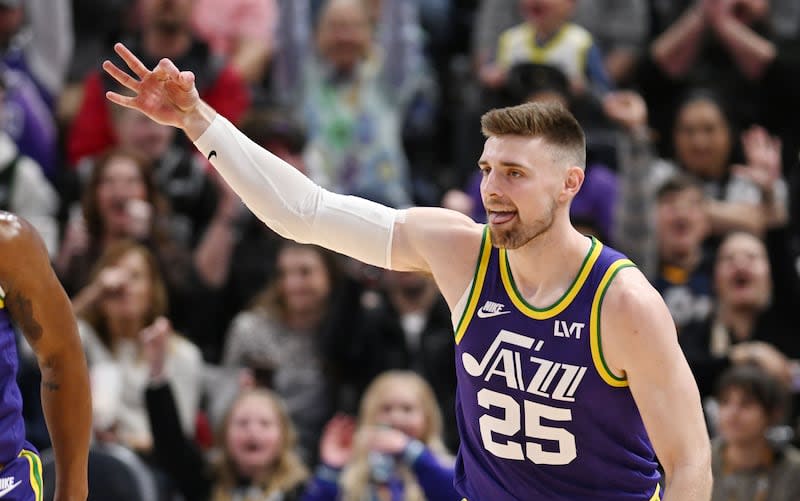The Jazz say they want to evaluate their young players — they can’t do that unless they play

For the Utah Jazz, the 2023-24 season is not about winning. Supposedly, according to the powers that be, the remainder of the season should focus on development and opportunity for the young players on the roster that have otherwise not had much opportunity to play legitimate NBA minutes.
The Jazz say they want to know more about the players that were recently drafted, the players that are at the end of the bench and those on two-way contracts.
Well, the clock is ticking. There are less than 20 games left in the season and there’s still a lot we don’t know.
After the trade deadline, rookies Taylor Hendricks and Brice Sensabaugh moved up from their G League assignments and have been a part of the Jazz’s rotation, averaging 22 minutes and 16.6 minutes, respectively. But other players have only been given the most minute of opportunities to play despite the Jazz front office explicitly saying they wanted to see more.
“This is an opportunity for those young players that haven’t had a chance to get as many minutes,” Jazz general manager Justin Zanik said on Feb. 10, two days after the trade deadline. “We do want to give them an opportunity now to have a chance to play in meaningful games.”
Zanik mentioned, by name, not only Hendricks and Sensabaugh, but also players like Luka Samanic and two-way players Johnny Juzang and Micah Potter. And meaningful games implies meaningful minutes and extended stints on the court that would allow some type of legitimate evaluation.
For the second consecutive season, it was made clear at the trade deadline that the Jazz are not trying to improve their chances of winning — at least in the short term. The Jazz traded away rotational players in order to maintain flexibility for the future and acquire future draft capital. As the Jazz continue to think long term, a crucial part of their plan is evaluating all talent that they acquire.
“In the calculus of who is going to have a chance to be with us going forward three, four or five years from now, we need to know more about the assets that we’ve already acquired and players that we have,” Zanik said. “I want to know at the end of the year about some of the guys that haven’t had as much of an opportunity.”
On Tuesday night, two-way player Micah Potter played 13 minutes for the Jazz. It was the 10th game he has played with the Jazz in the two seasons that he has been on a two-way deal with the team. It was just the second time that he has logged double-digit minutes with the Jazz.
Luka Samanic has only recently been given non-garbage-time minutes due to Lauri Markkanen and Hendricks being sidelined due to injury. Johnny Juzang also saw his first real run of the season last week when Keyonte George was sick and missed a couple games. Jason Preston, also on a two-way deal with the Jazz, has played just one minute with the Jazz, and the Jazz just added two more young forwards to the fray, signing Kenneth Lofton Jr. and Darius Bazley to nonguaranteed deals.
I imagine that a lot of people would have a lot of questions about giving so much opportunity to so many young players and would have plenty of arguments against doing so, so let’s run through some of that.
What would giving minutes to these players look like? Would it mean less playing time for some of the more proven players on the roster?
Yes. Absolutely. But, frankly, there’s not really much to be gleaned over the final games of the season from players like Markkanen, Collin Sexton, John Collins or Jordan Clarkson. We know what those players are capable of, we know what their strengths and weaknesses are, and we know where they need to improve.
Collins played 30 minutes on Tuesday night and Clarkson played nearly 34 minutes. Even Talen Horton-Tucker, a player on an expiring deal, who was completely out of the rotation earlier this season, played 17 minutes in the Jazz’s loss to the Celtics. More of those minutes could be distributed to players like Juzang and Potter and even Kira Lewis Jr., who the Jazz acquired in the deal that sent Kelly Olynyk and Ochai Agbaji to the Toronto Raptors.
What about chemistry-building with players who could be on the team long term?
To that, I would ask, does anyone really believe that the majority of the players on this roster will be here when the Jazz truly are vying for playoff contention? I don’t.
I think that the Jazz want to build around Markkanen and love the versatility that he offers when thinking about building a winning team. Outside of that, I guess you could say that Walker Kessler and Keyonte George are likely to be around for a while. So sure, play those guys and mix in some of these other young players who we know nothing about.
But Potter and Juzang have been playing for years in the G League, don’t we know enough about them from their play down there?
No, because as much as we can try to make assumptions based on play in the G League, there truly is no simulating the NBA experience. Hardy himself has said that real, extended NBA minutes are an imperative part of development for a player.
“It’s absolutely necessary in order to grow, really at all,” he said. “Because there’s things that you can watch on film, but there’s nothing like a game. And I think it also settles you down a little bit knowing that one mistake, two mistakes, are not the end of your opportunity. It allows you to to play with a little bit less anxiety. So I think it’s critical to get consistent minutes.”
And, when those players are with the SLC Stars, they are the primary players, the most heavily featured players. We need to know what they look like when they are expected to play in a tighter role. Can they impact the game doing the little things rather than being a leading scorer on the team? We don’t know.
Won’t cutting the minutes of the more veteran players make them mad?
Guess what, they’re not really that happy right now anyway. They’re on a losing team that will be wrapping up the season in April. An earnest conversation with them about a slight reduction in minutes in order to evaluate young player might not be the happiest moment in their lives, but it won’t be the tipping point either.
In recent games we’ve seen some flashes of athleticism and power from Samanic. We’ve also seen some timidness with the ball and some slow decision-making. I’d like to know if that’s something that turns around with more time or if that’s just the player that he is. We’ve seen Juzang able to score the ball at a high rate. I’d like to know if he can defend at a level that would allow him to stay on an NBA floor as a reserve role player.
On Tuesday night, we saw Potter shoot a perfect 3-of-3 from the floor, including hitting both of his 3-point attempts, while also showing a real understanding of some of the fundamental pieces of being a role player (boxing out, setting unplanned flare screens to keep teammates open and repositioning picks depending on a players driving preference).
“I’m really happy for Micah,” Hardy said after Tuesday’s game. “Micah has done everything and more than we’ve asked him to the last year-and-a-half. He’s a really good player, he’s solid as a rock, and when he shoots I think it’s going in. ... He has not gotten really any opportunity, and he’s played well in the G League. He comes to practice with us and works as hard as anybody. I think you see his physicality. I think you see his understanding of what’s going on. He’s really good at executing a game plan.”
I want to see more of that. I want to see what these players have to offer and, if the Jazz brass is to be believed, so do they. So they should tell Hardy that’s what they want.


